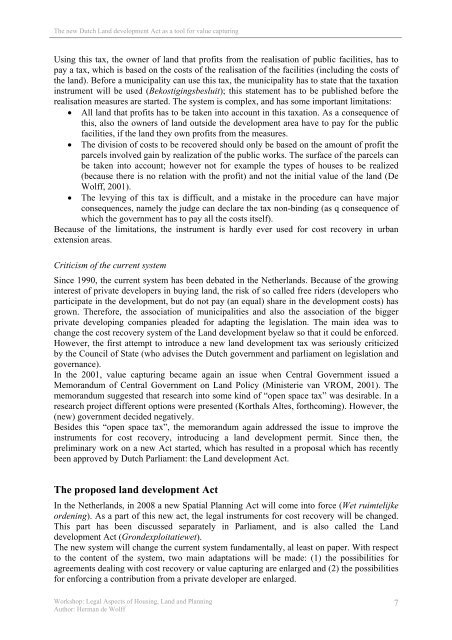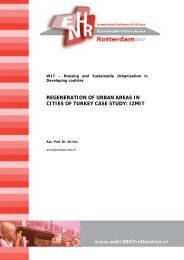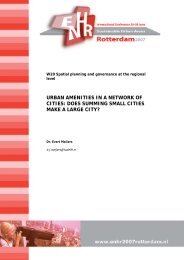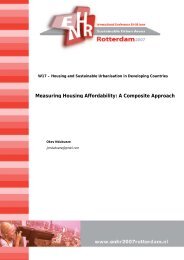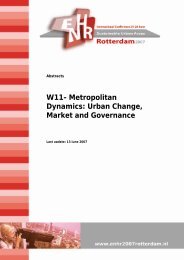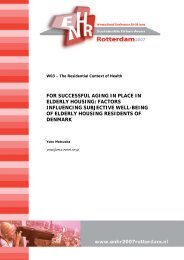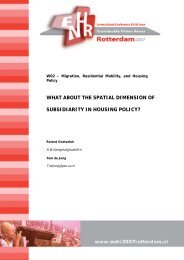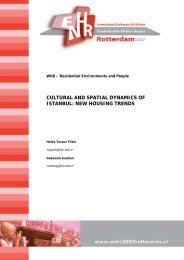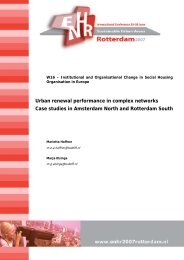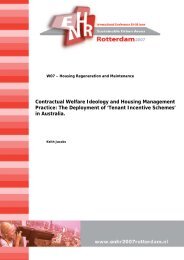The new Dutch Land development Act as a tool for value capturing
The new Dutch Land development Act as a tool for value capturing
The new Dutch Land development Act as a tool for value capturing
Create successful ePaper yourself
Turn your PDF publications into a flip-book with our unique Google optimized e-Paper software.
<strong>The</strong> <strong>new</strong> <strong>Dutch</strong> <strong>Land</strong> <strong>development</strong> <strong>Act</strong> <strong>as</strong> a <strong>tool</strong> <strong>for</strong> <strong>value</strong> <strong>capturing</strong><br />
Using this tax, the owner of land that profits from the realisation of public facilities, h<strong>as</strong> to<br />
pay a tax, which is b<strong>as</strong>ed on the costs of the realisation of the facilities (including the costs of<br />
the land). Be<strong>for</strong>e a municipality can use this tax, the municipality h<strong>as</strong> to state that the taxation<br />
instrument will be used (Bekostigingsbesluit); this statement h<strong>as</strong> to be published be<strong>for</strong>e the<br />
realisation me<strong>as</strong>ures are started. <strong>The</strong> system is complex, and h<strong>as</strong> some important limitations:<br />
• All land that profits h<strong>as</strong> to be taken into account in this taxation. As a consequence of<br />
this, also the owners of land outside the <strong>development</strong> area have to pay <strong>for</strong> the public<br />
facilities, if the land they own profits from the me<strong>as</strong>ures.<br />
• <strong>The</strong> division of costs to be recovered should only be b<strong>as</strong>ed on the amount of profit the<br />
parcels involved gain by realization of the public works. <strong>The</strong> surface of the parcels can<br />
be taken into account; however not <strong>for</strong> example the types of houses to be realized<br />
(because there is no relation with the profit) and not the initial <strong>value</strong> of the land (De<br />
Wolff, 2001).<br />
• <strong>The</strong> levying of this tax is difficult, and a mistake in the procedure can have major<br />
consequences, namely the judge can declare the tax non-binding (<strong>as</strong> q consequence of<br />
which the government h<strong>as</strong> to pay all the costs itself).<br />
Because of the limitations, the instrument is hardly ever used <strong>for</strong> cost recovery in urban<br />
extension are<strong>as</strong>.<br />
Criticism of the current system<br />
Since 1990, the current system h<strong>as</strong> been debated in the Netherlands. Because of the growing<br />
interest of private developers in buying land, the risk of so called free riders (developers who<br />
participate in the <strong>development</strong>, but do not pay (an equal) share in the <strong>development</strong> costs) h<strong>as</strong><br />
grown. <strong>The</strong>re<strong>for</strong>e, the <strong>as</strong>sociation of municipalities and also the <strong>as</strong>sociation of the bigger<br />
private developing companies pleaded <strong>for</strong> adapting the legislation. <strong>The</strong> main idea w<strong>as</strong> to<br />
change the cost recovery system of the <strong>Land</strong> <strong>development</strong> byelaw so that it could be en<strong>for</strong>ced.<br />
However, the first attempt to introduce a <strong>new</strong> land <strong>development</strong> tax w<strong>as</strong> seriously criticized<br />
by the Council of State (who advises the <strong>Dutch</strong> government and parliament on legislation and<br />
governance).<br />
In the 2001, <strong>value</strong> <strong>capturing</strong> became again an issue when Central Government issued a<br />
Memorandum of Central Government on <strong>Land</strong> Policy (Ministerie van VROM, 2001). <strong>The</strong><br />
memorandum suggested that research into some kind of “open space tax” w<strong>as</strong> desirable. In a<br />
research project different options were presented (Korthals Altes, <strong>for</strong>thcoming). However, the<br />
(<strong>new</strong>) government decided negatively.<br />
Besides this “open space tax”, the memorandum again addressed the issue to improve the<br />
instruments <strong>for</strong> cost recovery, introducing a land <strong>development</strong> permit. Since then, the<br />
preliminary work on a <strong>new</strong> <strong>Act</strong> started, which h<strong>as</strong> resulted in a proposal which h<strong>as</strong> recently<br />
been approved by <strong>Dutch</strong> Parliament: the <strong>Land</strong> <strong>development</strong> <strong>Act</strong>.<br />
<strong>The</strong> proposed land <strong>development</strong> <strong>Act</strong><br />
In the Netherlands, in 2008 a <strong>new</strong> Spatial Planning <strong>Act</strong> will come into <strong>for</strong>ce (Wet ruimtelijke<br />
ordening). As a part of this <strong>new</strong> act, the legal instruments <strong>for</strong> cost recovery will be changed.<br />
This part h<strong>as</strong> been discussed separately in Parliament, and is also called the <strong>Land</strong><br />
<strong>development</strong> <strong>Act</strong> (Grondexploitatiewet).<br />
<strong>The</strong> <strong>new</strong> system will change the current system fundamentally, al le<strong>as</strong>t on paper. With respect<br />
to the content of the system, two main adaptations will be made: (1) the possibilities <strong>for</strong><br />
agreements dealing with cost recovery or <strong>value</strong> <strong>capturing</strong> are enlarged and (2) the possibilities<br />
<strong>for</strong> en<strong>for</strong>cing a contribution from a private developer are enlarged.<br />
Workshop: Legal Aspects of Housing, <strong>Land</strong> and Planning<br />
Author: Herman de Wolff<br />
7


